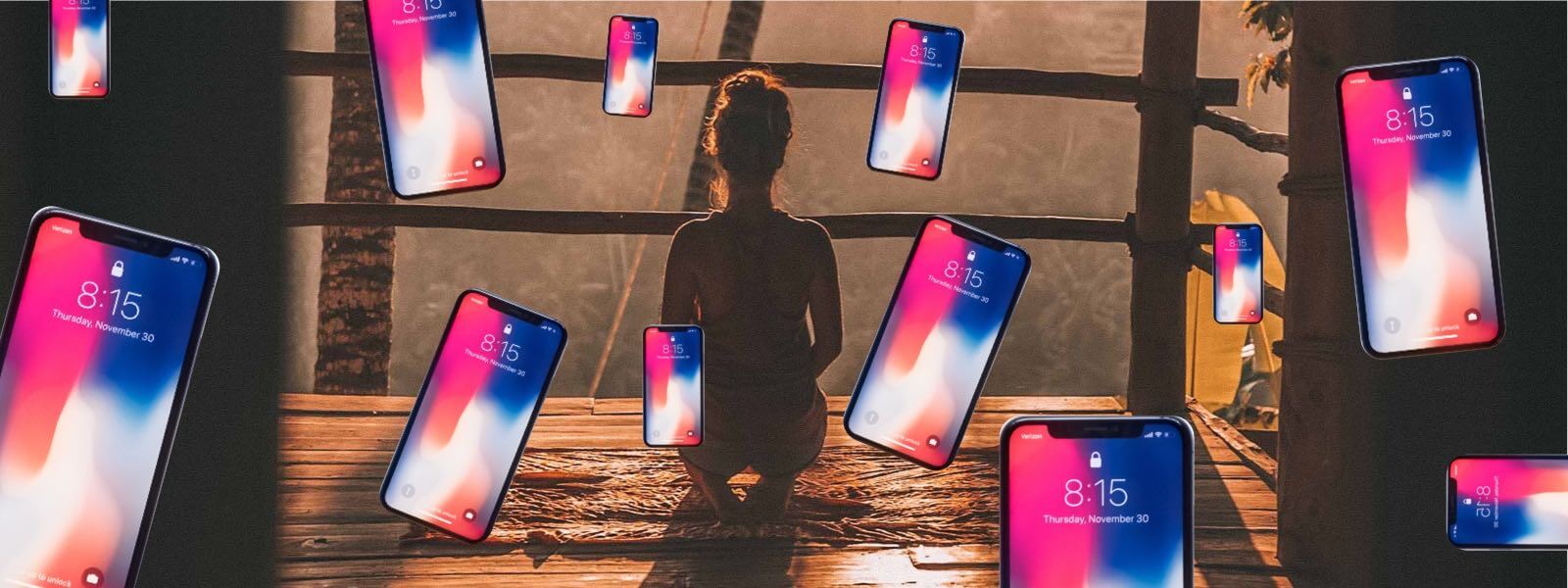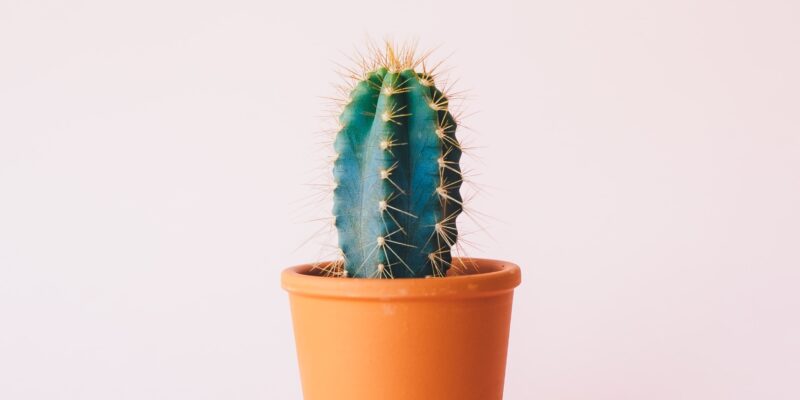As a psychologist and therapist, I get asked a lot about mindfulness and meditation:
What do you think about mindfulness? Should I start meditating? Will it help me fall asleep and be less stressed? I’ve heard it’s good for lowering blood pressure…
This isn’t surprising given how popular mindfulness meditation has become over the last few years. People have heard that it can help with problems like stress and anxiety, and they’re understandably curious but also want a professional opinion. And mindfulness meditation does, in fact, have many scientifically-proven benefits.
More surprising to me, though, is the inevitable follow up question:
What’s a good meditation app for my phone?
I guess this question shouldn’t come as a surprise given the increasing prominence of smartphones and personal technology in our lives. But it does surprise me. Perhaps because there’s something unnerving and deeply ironic about using a smartphone—the single greatest cause for compulsive distraction the world has ever known—to help us be more mindful and present.
Still, I get it. I understand why people ask. The idea of mindfulness meditation is intimidating. So it’s understandable that beginners would want to use something familiar like a phone to help ease them into the process. But I’m not sure it’s such a good idea.
Meditation apps tend to reinforce two common misconceptions about mindfulness meditation—that it’s complicated and that it’s easy—both of which tend to lead to discouragement and giving up before any of the benefits kick in. This is why so many people try mindfulness but don’t stick with it.
In the rest of this article, I’ll briefly walk through these two misconceptions about mindfulness and show how meditation apps reinforce them, ultimately, to our detriment.
Misconception #1: It’s Complicated
While mindfulness meditation is certainly challenging, it’s not particularly complicated, either in theory or practice. In fact, here’s everything you need to get started with mindfulness meditation in 24 words:
Pay attention to the physical sensation of breathing. If you find yourself distracted and your attention wandering, gently return your attention to your breath.
That’s really it.
Of course, there are secondary details about posture, duration, location, etc. But at its core, mindfulness meditation is just a simple, straightforward method for training our attention.
But most of us don’t believe it’s that simple. For whatever reason—maybe because of its roots in Eastern spirituality, for example—we assume mindfulness meditation is complicated and esoteric. And we feel like we need a friend or guide to show us the way—even if it’s a little cartoon on our phone with a soothing British accent.
With their plethora of options and upgrades, most mindfulness apps make the whole idea of mindfulness meditation seem much bigger and more complicated than it really is:
- Do I need a different type of meditation to help me sleep?
- If I have a big meeting coming up, should I use my Waves on the Beach Meditation or my Jungle Raindrops Meditation?
- What’s the best kind of meditation for anxiety? What about stress?
- Should I get a paid app or can I stick with the free one?
While these options are meant to aid us, they subtly encourage an overly complicated mindset around meditation.
This is problematic because, when we inevitable struggle in our meditation practice, the tendency will be to attribute that struggle to a lack of knowledge about meditation rather than the simple fact that’s it’s just hard.
Like exercise, meditation isn’t a struggle because it’s complicated and we lack knowledge; it’s a struggle because it’s inherently difficult.
So we download a couple new apps, fidget with a few more settings, and when our practice continues to be difficult, we get discouraged and give up, assuming it’s just too complicated for us or that we’ll never understand it.
Misconception #2: It’s Easy
In almost any meditation app you come across, you’ll notice that all of the marketing and branding around it is geared toward convincing regular folks that mindfulness meditation is easy.
But mindfulness isn’t easy. In fact, it’s extremely challenging most of the time.
By selling people on the idea that anyone can effortlessly start meditating regularly and rapidly get benefits from it, these mindfulness apps are setting up false hopes and expectations which can lead to unnecessary discouragement.
When we inevitably encounter difficulty or frustration in the early stages of our practice, our assumption that mindfulness should be easy can lead us to some unhelpful lines of thinking. In particular, it becomes easy to interpret our struggle as a sign that we aren’t cut out for this mindfulness thing and “just don’t have what it takes.” Consequently, we get discouraged and give up.
While the rise of smartphones and meditation apps may have increased the number of people who try meditation, I worry that they may also be increasing the number of people who give up on it prematurely.
All You Need to Know
Many people who try mindfulness meditation do it a handful of times, become frustrated and discouraged, and then give it up.
I believe mindfulness meditation apps are partly to blame for this because they encourage two unhelpful mindsets around meditation: That it’s complicated and that it’s easy.
In reality, meditation is the exact opposite: It’s simple and difficult.
And if we want to stick with meditation, we need to appreciate that from the outset and not blame our struggles on a lack of knowledge or interpret them as a sign that we shouldn’t continue.
I’m not suggesting that mindfulness apps are a bad idea all the time and for everyone—just that they can have powerful unintended negative consequences, especially for first-time meditators.
What to do instead
Unlike most meditation apps that I’ve used, well-written books about mindfulness tend to treat the subject with a little more nuance, even if it’s at the expense of flashiness and immediate ease of use.
What’s more, the very fact that a book is less sexy and requires more effort to consume is what makes it a better place to start. The struggle of reading a whole book on mindfulness foreshadows and prepares us for the struggles that will take place in a mindfulness practice. Consequently, we’re less surprised and discouraged when we encounter those struggles and more likely to persevere with our practice.
I think the best book for most people about how to get started with a basic mindfulness meditation practice is Sit Like a Buddha: A Pocket Guide to Meditation by Lodro Rinzler.
You could also check out my guide the topic: How to Start a Mindfulness Practice: A Quick Guide for Complete Beginners





12 Comments
Add YoursWell I kinda agree, I use headspace and calm ,they help somehow but I always go back to audio recording of kabat-zin on Catastrophic living and mindfulness meditation and stress reduction because he simplifies it ..
The audio book and apps helped me Alot , also headspace daily reminders and quote’s is nice I like it
Whatever helps people meditate is a good idea. I started w youtube videos, then Insight Timer (which I still love), and now I meditate alone and w the app. Hitting 900 sessions earlier this year (but not 1,000?) inspired me. It’s also nice to hear the chimes and music of you like. I see no downsides to an app.
And I disagree completely! With some of the first apps, yes. But Calm is truly different. There are so very many options to fill every need.
That being said, I have been practicing meditation for years.
I wholeheartedly find this article utter nonsense. I and many others utilize meditation apps with great success. Perhaps your definition of meditation. Differs, yet the research on positive effects mindful breathing on health is astounding. I can’t understand why one would write An article that could dissuade people from healthy habits. It seems snobbish.
I believe that everyone should see what works for them. I’ve read a book by Kabat-Zinn and it changed my life for that time period but when I try to find my way back to being a mindful human being, I can tend to seek outside sources to help me get back intune when actually everything we need to be mindful is inherent. But a little extra push from a therapist, an app, a YouTube video, etc may help one to get to recognize their inner wisdom concerning what it means to be truly mindful but it is not a success or fail to obtain this state of being. It just is….
Author writes “I’m not suggesting that mindfulness apps are a bad idea all the time and for everyone…” in an article titled “Why Meditation Apps Are a Bad Idea.” ????
This is an odd article. It makes all kinds of claims but don’t cite any sources to back up any of them. This wouldn’t get a passing grade in an undergraduate paper.
I’ve been meditating before there were any apps for it, but I think it’s wonderful to have such teachings available in such an accessible format. Not everyone learns well from books and not everyone has access to a teacher.
This article is a negative one.
Meditation does and has changed lives
for the better even helping in addictions
Perhaps if one is addicted to the phone itself a good meditation app might help them get started on a a NEW path to life
I highly agree with the person who said
to read a book to introduce one to start!
READ Jon Kabat-Zinn’s book Mindfulness for Beginners It May change your life and certainty nurture positive thoughts!
‘
From my experience in the many years that I have facilitated and instructed guided meditation & mental exercise, I would not encourage one who is unfamiliar with meditation to use an app as an introduction to this technique. The opportunity (like in a Yoga class or a related activity) for q & a, in-person human feedback is so valuable for the novice.
Meditation is not for peace of mind or good health. The only purpose of meditation is self discovery and God realisation. Meditation can’t take one far off until a perfect GURU is not there to initiate in meditation
Good sleep, peace of mind, good health All these are byproducts of meditation.
Please do not spread personal information and discourage people to try something and experience it themselves. I could never form a consistent practice without headspace. This article will turn people away who haven’t even tried these apps and some apps are truly helpful by providing essential guidance
Great, simple, clear, insightful, thoughtful article!
Irrespective of whether you like meditation apps or not, this article cuts to the heart of what meditation practice is, presents it in a nutshell, and dispels misconceptions that lead into blind alleys which thereby discourage diligence in practice or result in much wasted effort.
May “simple and difficult” be your constant companion and signpost on the beginningless and endless path!
To all you medutators Thaughts a doljs lịe dr joe dípenza who chảges big bucks and implies alot of miricles with his program Thaughts